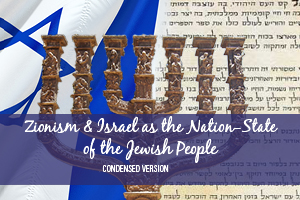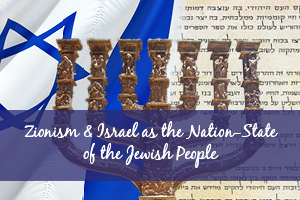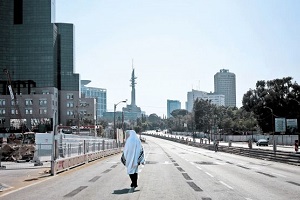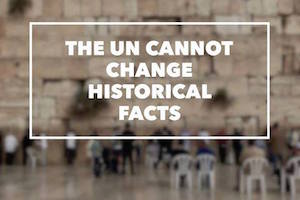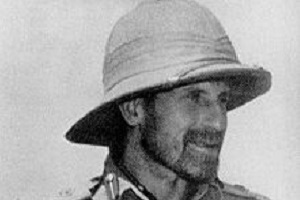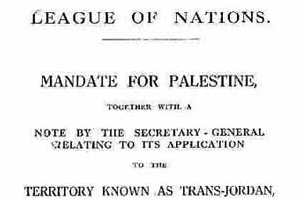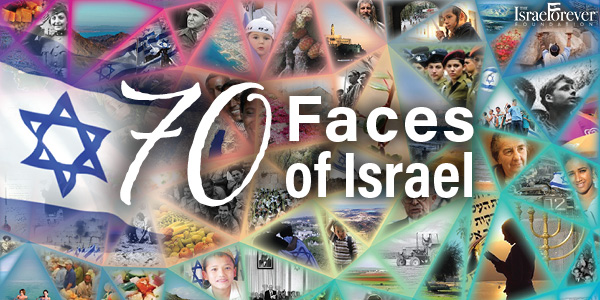Jewish Rights: A Nation State for the Jewish People
Interestingly, both anti-Semites and modern liberal Jews find themselves asking the same questions (albeit for different reasons): Is it legitimate to found and maintain a State specifically for the Jewish People?
The anti-Semite denies the legitimacy of the Jewish State out of hatred for the existence of the Jewish People. Jewish sovereignty is abhorrent because Jewish existence is abhorrent.
The liberal Jew on the other hand is taking into consideration the questions of pluralism, equality and an innate aversion to anything that could remotely be considered racism. In a time when political movements are calling for the abolition of borders and nationalism is equated with extremism it can seem difficult to defend the idea of a State for a single people.
Added to this is the additional complexity of the Arab population both within and without Israel, many of whom object to the existence of the Jewish State in its entirety while others say that their objections are to specific laws and policies of the Jewish State.
Countless documents, treaties and analysis have been produced discussing, promoting and negating these ideas. Here we propose putting all of those aside and going back to the most basic document regarding the foundation of the Jewish State – the Declaration of the Establishment of the State of Israel. Although the document was written before the questions of this time arose, it addresses them clearly and concisely, spelling out the reasons for the legitimacy of the Jewish Nation State.
ISRAEL'S DECLARATION OF INDEPENDENCE
In Hebrew there is no word for indigenous however, the description that opens the Declaration of Independence is the definition of indigeneity: the land in which a nation was born, the place where that nation first formed their culture, built spiritual, cultural and political institutions.
Israel is the land in which the Jewish people were sovereign and the place from which, as a Nation, the Jewish People influenced the world (through the ideas laid out in the Bible).
Indigeneity is the strongest claim any People can have to any specific land: this specific piece of land and no other is the ancestral homeland of my People. While lacking the word for indigenous in Hebrew it was clear that the writers of Israel’s Declaration of Independence had clear understanding of the meaning and the power of this concept.
This second paragraph reinforces the first with the explanation that the Jewish People were forcibly removed from their ancestral homeland and did not leave or abandon the land from their own free will. Despite centuries of exile, the Jewish People never gave up the hope to return and regain sovereignty in their ancestral homeland. This is an extraordinary and unparalleled testament to the deep connection of a People to the land.
This paragraph takes Jewish hope to the realm of practicality: Impelled by this historic and traditional attachment, impelled by Jewish history in the land and the connection that was continued in exile through hope and prayer, Jews strove in every successive generation to re-establish themselves in their ancient homeland. Jews not only retained esoteric hope but took action, in every generation, to re-establish themselves in their ancient homeland.
In recent decades (prior to the Declaration of Independence) Jews returned in their masses. Following this is a description mirroring the first paragraph of the document and elaborating the revival of the Jewish People in their indigenous land – reviving the language in which their original culture was articulated, building thriving communities, taking custodianship of the land (making the desert bloom), controlling their own economy and culture.
Here, for the first time, the document refers to “all the country’s inhabitants” – in other words, the Jews and non-Jews (Arabs). This was written after the Arab massacres of their Jewish neighbors:
- In 1920 a number of settlements in the Galilee were attacked (among them Tel Hai where Trumpeldor and seven others were murdered) and in Jerusalem. Some 30 Jews were murdered and hundreds injured.
- In 1921 Jews were attacked in Tel Aviv, Petach Tikva and Mikveh Yisrael and other communities, dozens were murdered and many more injured.
- In August of 1929 Jews in Jerusalem were attacked and entire neighborhoods were destroyed. In Hebron 69 Jews were massacred, many others were severely injured and the community was wiped out. Jews were also attacked in Haifa, Tel Aviv, Gaza, Ramleh, Akko, Beit Shean and more.
- The great Arab revolt of 1936-1939 in which 630 Jews were murdered and some 2000 were injured. At first Jews hoped that if they kept their heads down, the violence would subside. Then Orde Wingate decided to help the Jews, teaching them self-defense tactics which changed the balance of power (and have since become fundamental elements of the IDF’s doctrine).
It is within this context that the Declaration of Independence explains that the Jewish community while, loving peace knows how to defend itself and will bring the blessings of progress to all the country's inhabitants.
This right was recognized in the Balfour Declaration of the 2nd November, 1917, and re-affirmed in the Mandate of the League of Nations which, in particular, gave international sanction to the historic connection between the Jewish people and Eretz-Israel and to the right of the Jewish people to rebuild its National Home.”
Here the document moves from the explanation of indigenous rights to the discussion of Jewish rights under international law – from the first Zionist Congress, to the Balfour Declaration, it’s reaffirmation by the League of Nations which recognized the historic connection between the Jewish people and Eretz-Israel and to the right of the Jewish people to rebuild its National Home.
The Holocaust as an example, not a reason – in this paragraph the Declaration mentions the Holocaust, explaining that this is a clear demonstration of the need to solve the problem of homelessness by re-establishing in Eretz-Israel the Jewish State. It is important to note that the Holocaust is not brought as a reason or justification for the establishment of Israel but as an example of what can happen when the Jewish People have no Israel and are not seen by the community of nations as equal and with full privileges.
Here too as an example - also after the Holocaust, survivors and other Jews continued to make aliyah undaunted by difficulties and never ceased to assert their right to a life of dignity, freedom and honest toil in their national homeland. It was not because of the Holocaust survivors that the State of Israel was established but they, whose dignity had been stripped from them, joined those already struggling to establish a life of Jewish freedom and were followed by additional Jews who all came together in their national homeland.
This paragraph is an interesting assertion of rights of Israel’s Jewish community, not because they are freely given (as one might expect) but as something earned due to behaving like other peace-loving nations and through the blood of its soldiers.
The United Nations General Assembly passed a resolution calling for the establishment of a Jewish State in Eretz-Israel but this was not something the nations swooped in and did for the Jewish People; the General Assembly required the inhabitants of Eretz-Israel to take such steps as were necessary on their part for the implementation of that resolution – which they did. Was the statement of legal fact, that the recognition by the United Nations of the right of the Jewish people to establish their State is irrevocable, a premonition of future questions regarding the legitimacy of the Jewish State?
The right to be master of your own fate is a natural right. The Jewish People, like all other nations, have the right to their own sovereign State.
In accordance with all the reasons given above, by virtue of our natural and historic right and on the strength of the resolution of the United Nations General Assembly, on the termination of the British Mandate over Eretz Israel the representatives of the Jewish Community of Israel (not the Jewish world community) and of the Zionist Movement (the National Movement for Jewish self-determination) declare the establishment of a Jewish state in Eretz-Israel, to be known as the State of Israel. This was an important determination that the Jewish historic name of the land would be the name by which the new State would be called.
Here the document declares the State of Israel open to immigration of all Jews, the basis for what is now called the “Law of Return”. While the document clearly discusses Jewish rights, it is important that here, we see for the second time, mention of “all inhabitants.” The addition of these two little words explains a crucial concept - the Jewish People are recognized as indigenous and have the rights of an indigenous people returning to their ancestral homeland.
The other inhabitants, while not indigenous, are recognized as having rights do to their residence within the land and thus, in accordance with the visions of the prophets of Israel who described what the Jewish State needs to look like and in accordance to the principles of the Charter of the United Nations the State of Israel will provide for the benefit of all, not just the Jews but for Jews and Arabs alike: the development of the country, freedom, justice and peace, complete equality of social and political rights to all its inhabitants irrespective of religion, race or sex; it will guarantee freedom of religion, conscience, language, education and culture; it will safeguard the Holy Places of all religions.
These rights were later established in Israeli law but it is important to note that those were a realization of this declaration which was based on the ancient visions of what a Jewish State needs to be.
The declaration expresses the willingness of the new State to cooperate with international bodies and requests that the United Nations assist the Jewish People and receive the State of Israel into the community of nations.
Here, for the first time, the Arab inhabitants of Israel are addressed directly, in the context of the previous pogroms against the Jews of Israel and the winds of war that were recognized by the declarers - with the request to preserve peace and participate in the upbuilding of the State on the basis of full and equal citizenship and due representation in all its provisional and permanent institutions.
The declaration does not stop with the Arab inhabitants of Israel but extends a hand of peace to all neighboring Arab countries and an offer of collaboration – that they assist with the settling Jews in the sovereign Jewish State (a request that includes the Jews living at the time in Arab lands) and a promise that the State of Israel will do its share in a common effort for the advancement of the entire Middle East.
The last request is to Jews around the world to assist with the tasks of immigration and upbuilding and stand by the Jews of Israel in the great struggle for the realization of the age-old dream - the redemption of Israel.
Placing our trust in the Almighty [the first and only time God is mentioned in the document], we affix our signatures to this proclamation at this session of the provisional Council of State, on the soil of the Homeland, in the city of Tel-Aviv, on this Sabbath eve, the 5th day of Iyar, 5708 (14th May, 1948).
Recommended for you:
Israel is both more (and less) than people imagine. It is her complexity that makes her beautiful
Next time someone asks you, what is Israel like? Tell them, “She has 70 Faces”
About the Author


